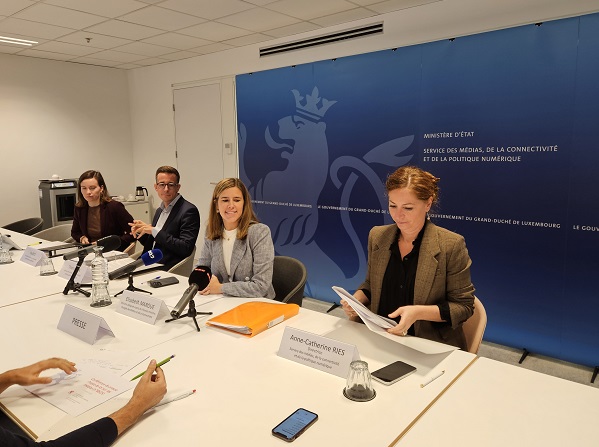 (Second from right): Elisabeth Margue, Luxembourg’s Minister Delegate to the Prime Minister for Media and Connectivity;
Credit: Jazmin Campbell, Chronicle.lu
(Second from right): Elisabeth Margue, Luxembourg’s Minister Delegate to the Prime Minister for Media and Connectivity;
Credit: Jazmin Campbell, Chronicle.lu
On Thursday 7 October 2025, Luxembourg’s Minister Delegate to the Prime Minister for Media and Connectivity, Elisabeth Margue, presented the draft media law (Bill no. 8625) at a press conference.
According to the Department of Media, Connectivity and Digital Policy (SMC) of the Ministry of State, the bill aims to modernise the legislative framework applicable to a wide range of media and their oversight.
Minister Margue stressed that the 1991 law is no longer sufficient to cover the evolving media landscape, which now encompasses online newspapers and radio, podcasts, influencers and other digital content providers alongside traditional outlets. The minister emphasised the importance of safeguarding both media independence and plurality.
The draft law seeks to ensure a level playing field across all media actors while also integrating European regulations, including the European Media Freedom Act and rules on political advertising. It introduces a broader scope, applying a common set of rules to all media services. This includes influencers with significant reach, podcasters, content creators and online publishers. For providers outside Luxembourg’s jurisdiction, the “country of origin” principle will apply. The bill also sets out explicit prohibitions on illegal content, such as hate speech and child pornography.
The existing regulator, ALIA, will be renamed from “Autorité luxembourgeoise indépendante de l’audiovisuel” (Luxembourg’s independent audiovisual authority) to “Autorité luxembourgeoise indépendante des medias” (Luxembourg’s independent media authority) to reflect its expanded remit. With reinforced powers and reformed governance, the authority will not only impose sanctions but also promote pluralism and support stakeholders. Collaboration with the Press Council will be strengthened, while the latter retains full self-regulatory powers. ALIA may not intervene with professional journalists without consulting the Press Council.
The reform process began in spring 2024 and included a series of public conferences and meetings with stakeholders. The conferences, held between May and December 2024, explored topics such as the context of the Luxembourg and European media landscape, the role of influencers and online content creators, the use of artificial intelligence (AI) in journalism, national and international laws on hate speech, and the harmful impact of disinformation on democracy.
Asked about the process timeline, Minister Margue explained that the government had taken the time needed to ensure input from all national actors before finalising the bill.
More information on the bill can be found on the Chamber of Deputies website.








